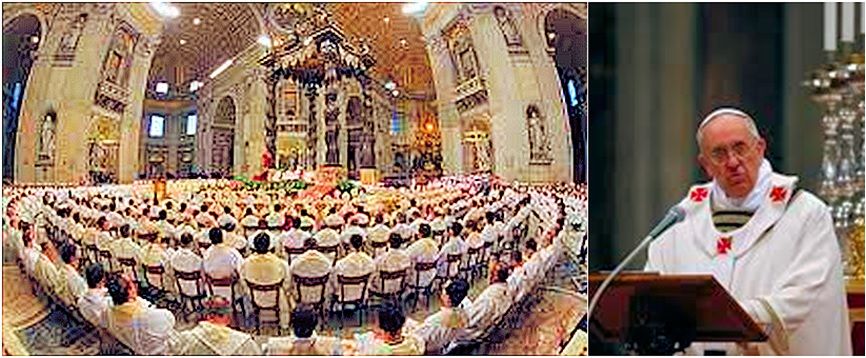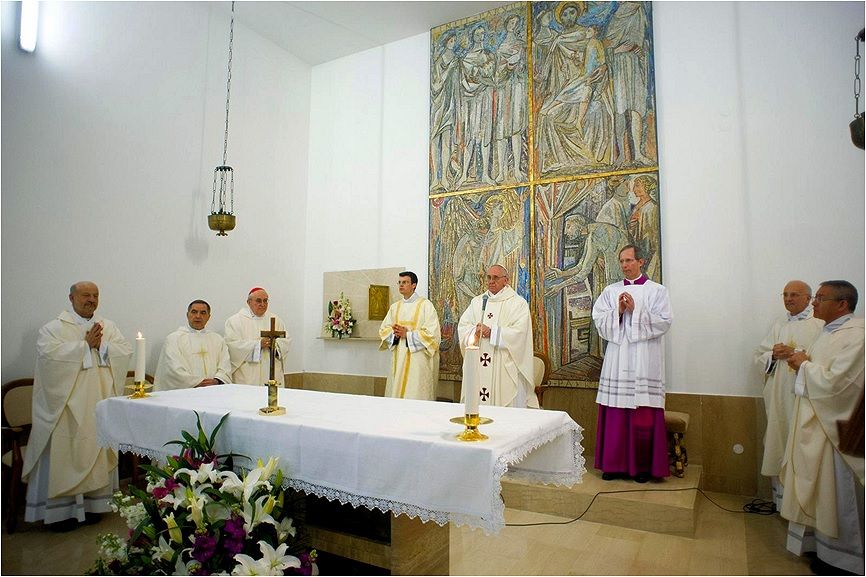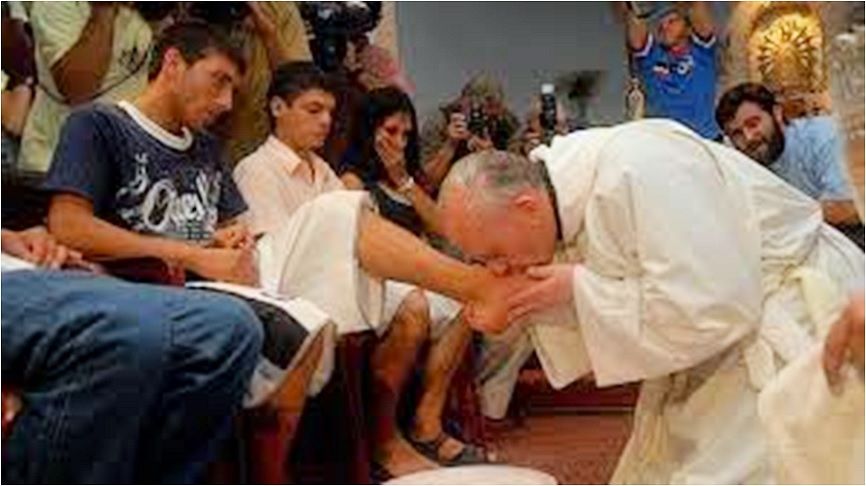| | | OFFLINE | | Post: 26.526
Post: 9.013 | Registrato il: 28/08/2005
Registrato il: 20/01/2009 | Administratore | Utente Master | |
|

 I apologize for this belated posting, but I had worked on the post late last night (Friday) before going to bed, and I lost it through some unintended keystroke just as I was preparing to save it - so I had to reconstruct it all over.
Pope tells priests to 'go out
I apologize for this belated posting, but I had worked on the post late last night (Friday) before going to bed, and I lost it through some unintended keystroke just as I was preparing to save it - so I had to reconstruct it all over.
Pope tells priests to 'go out
and give yourself to others'

March 28, 2013

At 9:30 a.m. on Maundy Thursday, the Holy Father Francis presided at the Chrismal Mass in St. Peter's Basilica, a liturgy that is celebrated on this day in all the cathedral churches around the world.
Conceleberating were all the cardinals and bishops present in Rome, along with some 1,600 priests and religious. During the Mass, they all renewed the vows they made at their priestly ordination.
The Holy Father then blessed the oils to be used at St. Peter's in the coming year for anointing the sick (Extreme Unction), the catechumens (for Baptism), and the Chrism (for Holy Orders).
Here is the Vatican's translation of the Pope's first homily:
Dear Brothers and Sisters,
This morning I have the joy of celebrating my first Chrism Mass as the Bishop of Rome. I greet all of you with affection, especially you, dear priests, who, like myself, today recall the day of your ordination.
The readings and the Psalm of our Mass speak of God’s "anointed ones": the suffering Servant of Isaiah, King David and Jesus our Lord. All three have this in common: the anointing that they receive is meant in turn to anoint God’s faithful people, whose servants they are; they are anointed for the poor, for prisoners, for the oppressed…
A fine image of this "being for" others can be found in the Psalm 133: "It is like the precious oil upon the head, running down upon the beard, on the beard of Aaron, running down upon the collar of his robe" (v. 2).
The image of spreading oil, flowing down from the beard of Aaron upon the collar of his sacred robe, is an image of the priestly anointing which, through Christ, the Anointed One, reaches the ends of the earth, represented by the robe.
The sacred robes of the High Priest are rich in symbolism. One such symbol is that the names of the children of Israel were engraved on the onyx stones mounted on the shoulder-pieces of the ephod, the ancestor of our present-day chasuble: six on the stone of the right shoulder-piece and six on that of the left (cf. Ex 28:6-14). The names of the twelve tribes of Israel were also engraved on the breastplate (cf. Es 28:21).
This means that the priest celebrates by carrying on his shoulders the people entrusted to his care and bearing their names written in his heart. When we put on our simple chasuble, it might well make us feel, upon our shoulders and in our hearts, the burdens and the faces of our faithful people, our saints and martyrs who are numerous in these times.
From the beauty of all these liturgical things, which is not so much about trappings and fine fabrics than about the glory of our God resplendent in his people, alive and strengthened, we turn now to a consideration of activity, action.
The precious oil which anoints the head of Aaron does more than simply lend fragrance to his person; it overflows down to "the edges". The Lord will say this clearly: his anointing is meant for the poor, prisoners and the sick, for those who are sorrowing and alone. My dear brothers, the ointment is not intended just to make us fragrant, much less to be kept in a jar, for then it would become rancid … and the heart bitter.
A good priest can be recognized by the way his people are anointed: this is a clear proof. When our people are anointed with the oil of gladness, it is obvious: for example, when they leave Mass looking as if they have heard good news.
Our people like to hear the Gospel preached with "unction", they like it when the Gospel we preach touches their daily lives, when it runs down like the oil of Aaron to the edges of reality, when it brings light to moments of extreme darkness, to the "outskirts" where people of faith are most exposed to the onslaught of those who want to tear down their faith.
People thank us because they feel that we have prayed over the realities of their everyday lives, their troubles, their joys, their burdens and their hopes.
And when they feel that the fragrance of the Anointed One, of Christ, has come to them through us, they feel encouraged to entrust to us everything they want to bring before the Lord: "Pray for me, Father, because I have this problem", "Bless me Father", "Pray for me" – these words are the sign that the anointing has flowed down to the edges of the robe, for it has turned into a prayer of supplication, the supplication of the People of God.
When we have this relationship with God and with his people, and grace passes through us, then we are priests, mediators between God and men. What I want to emphasize is that we need constantly to stir up God’s grace and perceive in every request, even those requests that are inconvenient and at times purely material or downright banal – but only apparently so – the desire of our people to be anointed with fragrant oil, since they know that we have it.
To perceive and to sense, even as the Lord sensed the hope-filled anguish of the woman suffering from hemorrhages when she touched the hem of his garment. At that moment, Jesus, surrounded by people on every side, embodies all the beauty of Aaron vested in priestly raiment, with the oil running down upon his robes. It is a hidden beauty, one which shines forth only for those faith-filled eyes of the woman troubled with an issue of blood.
But not even the disciples – future priests – see or understand: on the "existential outskirts", they see only what is on the surface: the crowd pressing in on Jesus from all sides (cf. Lk 8:42). The Lord, on the other hand, feels the power of the divine anointing which runs down to the edge of his cloak.
We need to "go out", then, in order to experience our own anointing, its power and its redemptive efficacy: to the "outskirts" where there is suffering, bloodshed, blindness that longs for sight, and prisoners in thrall to many evil masters.
It is not in soul-searching or constant introspection that we encounter the Lord: self-help courses can be useful in life, but to live our priestly life going from one course to another, from one method to another, leads us to become pelagians and to minimize the power of grace, which comes alive and flourishes to the extent that we, in faith, go out and give ourselves and the Gospel to others, giving what little ointment we have to those who have nothing, nothing at all.
The priest who seldom goes out of himself, who anoints little – I won’t say "not at all" because, thank God, the people take the oil from us anyway – misses out on the best of our people, on what can stir the depths of his priestly heart.
Those who do not go out of themselves, instead of being mediators, gradually become intermediaries, managers. We know the difference: the intermediary, the manager, "has already received his reward", and since he doesn’t put his own skin and his own heart on the line, he never hears a warm, heartfelt word of thanks.
This is precisely the reason for the dissatisfaction of some, who end up sad – sad priests - in some sense becoming collectors of antiques or novelties, instead of being shepherds living with "the odour of the sheep".
This I ask you: be shepherds, with the "odour of the sheep", make it real, as shepherds among your flock, fishers of men. True enough, the so-called crisis of priestly identity threatens us all and adds to the broader cultural crisis; but if we can resist its onslaught, we will be able to put out in the name of the Lord and cast our nets.
It is not a bad thing that reality itself forces us to "put out into the deep", where what we are by grace is clearly seen as pure grace, out into the deep of the contemporary world, where the only thing that counts is "unction" – not function – and the nets which overflow with fish are those cast solely in the name of the One in whom we have put our trust: Jesus.
Dear lay faithful, be close to your priests with affection and with your prayers, that they may always be shepherds according to God’s heart.
Dear priests, may God the Father renew in us the Spirit of holiness with whom we have been anointed. May he renew his Spirit in our hearts, that this anointing may spread to everyone, even to those "outskirts" where our faithful people most look for it and most appreciate it.
May our people sense that we are the Lord’s disciples; may they feel that their names are written upon our priestly vestments and that we seek no other identity; and may they receive through our words and deeds the oil of gladness which Jesus, the Anointed One, came to bring us. Amen.
 Pope tells young detainees not
Pope tells young detainees not
to let themselves be robbed of hope

March 28, 2013
At 5:00 pm on Maundy Thursday, Pope Francis left the Vatican to go to Rome;s Istituto Penale per Minori in Casal del Marmo, where at 5:30 p.m., he celebrated the Mass of the Lord's Supper, which begins the Paschal Triduum.

Concelebrating with in the detention center's chapel dedicated to the Merciful Father were Cardinal Agostino Vallino, the Pope's Vicar for Rome; Mons. Angelo Becciu, deputy Secretary of State for general affairs; Mons Alfred Xuereb, the Pope's secretary; Fr. Gaetano Greco, a tertiary Franciscan who is the chaplain of the institute, and a Franciscan colleague of his.
Attending the Mass were some 50 minors of various nationalities and faiths who are detained for various offenses, among them 11 females, as well as representatives of the various departments of the center.
During the Mass, Pope Francis washed the feet of 12 detainees, including two women, one of the Muslim.
Here is the Vatican translation of the Pope's brief homily before proceeding to the washing of the feet:
This is moving. Jesus, washing the feet of his disciples. Peter didn’t understood it at all, he refused. But Jesus explained it for him. Jesus – God – did this!
He himself explains to his disciples: "Do you know what I have done to you? You call me Teacher and Lord – and you are right, for that is what I am. So if I, your Lord and Teacher, have washed your feet, you also ought to wash one another’s feet. For I have set you an example, that you also should do as I have done to you" (Jn 13:12-15).
It is the Lord’s example: he is the most important, and he washes feet, because with us, what is highest must be at the service of others. This is a symbol, it is a sign, right?
Washing feet means: "I am at your service". And with us too, don’t we have to wash each other’s feet day after day? But what does this mean? That all of us must help one another. Sometimes I am angry with someone or other … but… let it go, let it go, and if he or she asks you a favour, do it.
Help one another: this is what Jesus teaches us and this what I am doing, and doing with all my heart, because it is my duty. As a priest and a bishop, I must be at your service.
But it is a duty which comes from my heart: I love it. I love this, and I love to do it because that is what the Lord has taught me to do. But you too, help one another: help one another always. One another. In this way, by helping one another, we will do some good.
Now we will perform this ceremony of washing feet, and let us think, let each one of us think: "Am I really willing, willing to serve, to help others?". Let us think about this, just this. And let us think that this sign is a caress of Jesus, which Jesus gives, because this is the real reason why Jesus came: to serve, to help us.

After the Mass, before returning to the Vatican, Pope Francis met with the entire 'family' of the institution at the center's gymnasium, in the presence of the Italian Minister of Justice, Madame Paola Severino; the head of her ministyr's department for juvenile justice, Caterina Chinnici; the commandant of Casal del Marmo's penitentiary police Saulo Patrizi; and the director of the Center, Liana Giambartolomei.
The detainees presented the Pope with a wooden crucifix and a wooden kneeler, both items crafted by them in the center's workshop.
During the meeting, the Pope said the following, first in response to Minister Severino's greeting, and then to a question by one of the detainees:
I thank the Madame Minister for her words, I thank the authorities for your welcome, and I thank you, boys and girls, for your welcome today. I am happy to be with you.
So, move forward, yes? Do not allow your hope to be robbed from you, do not allow your hope to be robbed from you! Is that understood? Then move forward, but always with hope. Thank you.
A young man asked a question:
Thank you, Father, for coming here today. I would like to know one thing: Why did you come to Casal del Marmo today? That's all I want to know.
It's a sentiment that came from my heart - I felt it. Where, I asked, are those who could perhaps help me best to be humble, to be a servant as a bishop ought to be? I thought, and I asked: "Who and were are those would appreciate a visit from me?"
I was told, "Perhaps Casal del Marmo". When they said that, I decided to come here. But it all came from the heart, only from the heart. The things of the heart cannot be explained, they just come. So thank you, yes? [I have translated in both instances the Italian particle 'eh?' as 'yes?']
The Pope's final words:
Now I take my leave from you. Thank you so much for your welcome. Pray for me, and do not let yourself be robbed of hope. Always move forward. Thank you so much.
So there was no Eucharistic Adoration, which is the concluding part of the Mass of the Last Supper. Of course, the chapel has no side altar to which the Blessed Sacrament can be 'repositioned' till Easter, but the Eucharist could still have been exposed at the same altar. It was a perfect teaching moment to introduce a beautiful practice to the Catholics among the detainees. But maybe the Pope felt it was too much to ask of them, that this was not part of the simple and essential message he wanted to convey on this occasion...
[Modificato da TERESA BENEDETTA 30/03/2013 19:59] |